Literary Perspectives from Tibetan and Himalayan Women Writers
Event: 2022 Lotsawa Translation Workshop – Plenary Session
Date: October 16, 2022 – 9:00 am
Speakers: Françoise Robin, Kelsang Lhamo, Kunzang Choden, Nyima Tso, Tashi Dekyid Monet, Tsering Yangzom Lama
Topics: Contemporary Tibetan Literature, Tibetan Identity and Culture, Tibetan female writers
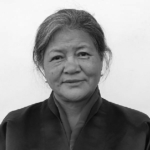
Kunzang Choden
Kunzang Choden was born in Bumthang, central Bhutan in 1952, a time when there were no educational opportunities for girls, so she did her entire education in India in English medium schools. Later, she studied Psychology and Sociology in colleges in India and the US. She began her professional career as a teacher and worked for a while with the UN. Her first book, Folktales of Bhutan, was published in 1994. Since then she continue to write on a variety of topics, but her main interest is still oral and folk traditions, especially pertaining to women. Her notable publications include the novel Circle of Karma (2005) and collection of short stories, Tales in Colour and Other Stories (2009). Today, she writes mainly for children and young adults.
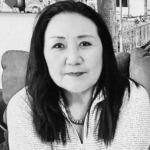
Kelsang Lhamo
Kelsang Lhamo was born 1973 in Lhokha area, south of Lhasa. She received teachings from Sheldrak Khen Rinpoche and Dungkar Losang Trinlé, mainly on Tibetan medicine, but also on the Five Minor Sciences, mostly Nyingma teachings. To pursue further studies, she left for India in 1989. She received novice vows from His Holiness The 14th Dalai Lama, and for a period of ten years studied and received Geluk teachings, mainly from Geshe Drubthob Rinpoche and many other masters. At the same time she studied Hindi language and the Vedas in Varanasi.
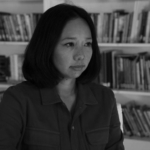
Tsering Yangzom Lama
Tsering Yangzom Lama is a Tibetan writer. She was born and raised in Nepal, and has since lived in Canada and the United States. Tsering earned her MFA in writing from Columbia University and a BA in Creative Writing and International Relations from the University of British Columbia. Her debut novel WE MEASURE THE EARTH WITH OUR BODIES is out with Bloomsbury USA and McClelland & Stewart in Canada, and will be translated into Dutch, French, and Italian.
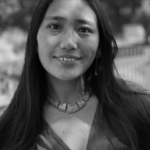
Tashi Dekyid Monet
Tashi Dekyid Monet (མོ་ངེ་བཀྲ་ཤིས་བདེ་སྐྱིད།) is a PhD candidate in the School of Education and Human Development at University of Virginia. She is currently working on a dissertation project titled “Knowing with the Indigenous Land: Reimagining Knowledge, Place, and Community in Tibetan Education”. She grew up in Minyak Kham and completed a BA in Tibetan language and Literature from Minzu University of China in 2011. She was previously a translation contributor to the anthology of the translated World Literature (འཛམ་གླིང་རྩོམ་རིག) that has been published annually in China since 2017. She is a co-organizer of the Tibetan Women Writing Symposium (April 8-10, 2022) at University of Virginia.
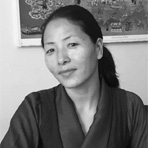
Nyima Tso
Nyima Tso was born in Bora village near Amdo Labrang, and has been based in India since coming into exile in 1999. She published First Journey of Life (མི་ཚེ་འདིའི་འགྲུལ་བཞུད་དང་པོ་), a poetry collection, in 2003 before completing a Bachelor’s Degree in 2005 and a Masters Degree in 2008 at the Norbulingka Institute in Dharamsala, India. Her writing has garnered many awards, including first place in the 2007 Tibetan Women Writers competition organized by the Tibetan Women’s Association. Her Fragment (ཟུར་ཞིག), published in 2007, was the first collection of stories published by a Tibetan woman in exile. She is now the secretary of the Tibetan Writers Abroad PEN Centre in Dharamsala, where she has given many workshops on Tibetan literature, and serves as the coordinator of their Women Writers’ Committee. She is also the director of the department of traditional and nontraditional cultural production at the Norbulingka Institute of Tibetan Culture and serves as editor of Mayum (མ་ཡུམ་), a quarterly publication with articles by Tibetan women writers in exile. In her spare time, she researches folktales and poetry and writes children’s stories. As of 2019, she had translated thirty-two children’s books into Tibetan.

Françoise Robin
Professor Françoise Robin has been studying and translating contemporary Tibetan literature (mainly fiction and poetry) since the late 1990s, examining its relevance for our understanding of today’s Tibetan society. Over the years, she has regularly travelled to Tibet and has become familiar with writers, poets and later, filmmakers, as well as their works. Most of her research combines social observation with literary and film creation, and have recently focused more on women’s writings, the rise of Tibetan feminism as well the relationship between literature and women’s empowerment in the Tibetan context. She has been teaching Tibetan language and literature at Inalco (French National Institute for Oriental Languages and Civilisations), France, for the last twenty years. She regularly publishes French translation of Tibetan works. Tempête rouge, her translation of Tsering Dondrup’s The red wind howls (Rlung dmar ‘ur ’ur), was awarded the literary prize “Montluc Résistance et Liberté” in 2020.
